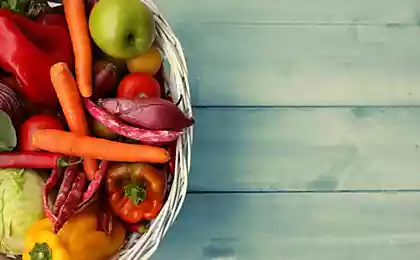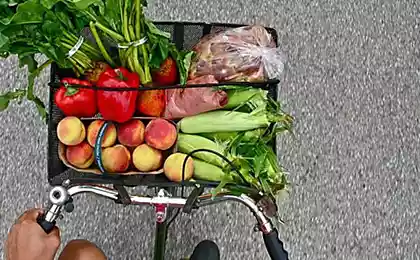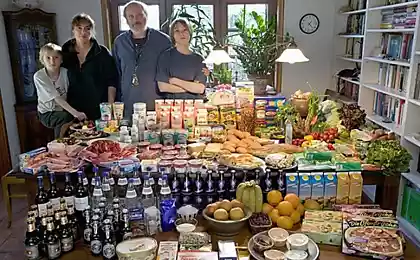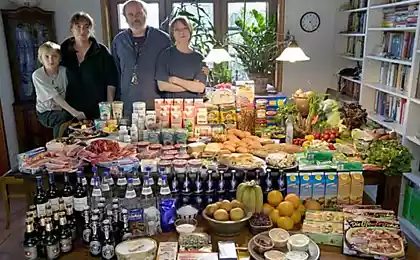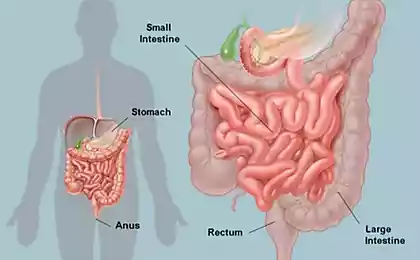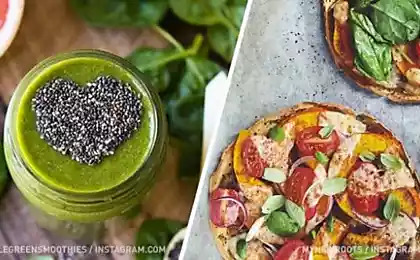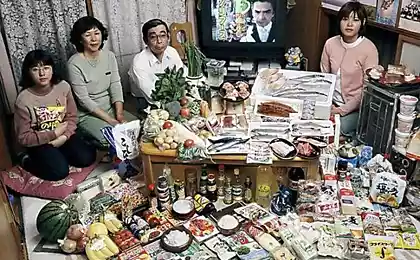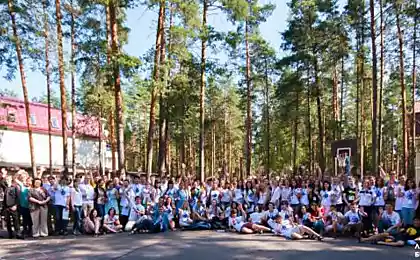601
Mark Bittman: WHAT's wrong with our diet
In his heartfelt and humorous speech mark Bittman, a correspondent for the new York times, who leads the food column, shows what is wrong in our diet at the moment (too much meat, too few plants too much fast food, too little home cooking), and than it threatens the entire world.
https://embed.ted.com/talks/lang/ru/mark_bittman_on_what_s_wrong_with_what_we_eat
SUBSCRIBE to OUR youtube channel that allows you to watch online, download from YouTube free video about the recovery, the rejuvenation of man. Love for others and ourselves, as the feeling of high vibrations — an important factor
0:11
I write about food. I write about how to cook. I take it quite seriously, but I'm here to talk about what was really important to me over the last two years It is about food, but not cooking itself. Start with a photo of a beautiful cow. I'm not a vegetarian, it seems so early loved to talk and Nixon, remember? But I still think that this -- (Laughter) this year's version of this.
0:38
It's just a little exaggerated. Why am I saying this? Because only once before has the fate of individual people and the fate of humanity been so intertwined. In the past it was the threat of the atomic bomb, and now a bomb of another kind.
And depending in which direction we go depends not only on the quality and length of our lives, but how we would know the ground, if I saw her in a hundred years. It's a Holocaust of a different kind, and to bury your head in the sand is not an option. Let's start with the fact that global warming is not only real, but dangerous. Since every scientist in the world thinks so, and even President Bush realized this, or pretends to understand, and we can take it as a given.
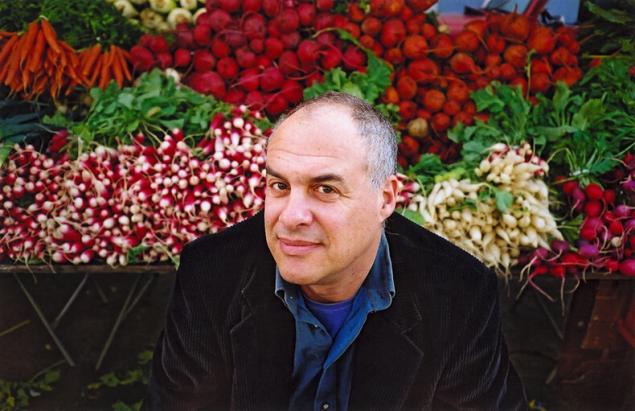
1:23
Then listen to what I say. Cattle ranching is in second place after energy generation on emissions of gases that affect the atmosphere. Almost 1/5 of all greenhouse gas is generated by livestock production. It's more than transportation. Now, you can joke about cow farts, but methane is 20 times more poisonous than carbon dioxide.
And not just methane.Cattle ranching is also one of the biggest culprits in land degradation, air and water pollution, water shortages and loss of biodiversity. And another thing.
Like half the antibiotics in this country are not administered by people and animals. Such examples cause the daze, so I'll just say that if you are a progressive man, drive a Prius or buy only eco-friendly things, or look for environmentally friendly products, then perhaps you should be semi-vegetarian. So, I'm in the same extent against cows, as well as against nuclear energy, but it all depends on how we use this. There's another piece of the puzzle, which beautifully yesterday said Ann Cooper, and you are already familiar with it.
2:31
There is no doubt, absolutely no doubt that the so-called diseases of lifestyle such as diabetes, heart disease, strokes and some cancers, are much more common here than anywhere else. And this is the result of eating a Western diet. Our demand for meat, dairy products, and refined carbohydrates - the world consumes one million cans or bottles of coke a day - our demand for these products, not need, and desire, leads to consumption of more calories than we need.
And those calories are in foods that cause, not prevent, disease. Global warming was unforeseen. We didn't know that pollution leads to more problems than just poor visibility. Well, maybe a few lung diseases here and there, but this is not such a problem. In fact, the health crisis today is more the result of the work of the evil Empire. We were told, we were assured, that the more meat, dairy and poultry we ate, the healthier we will be.
3:33
No. Overconsumption of animals, and of course, fast food, along with our paltry consumption of plant foods is the problem. Now is not the time to talk about the benefits of plant foods; it is proven that plants, I stress, not the ingredients in plants, and the plants themselves, not the beta-carotene and carrots, and so, it is proven that plants promote health.
Evidence of this at the moment a great many. You eat more plants, eat less other stuff, you live longer. Well. Back to meat and junk food. What is common between them? First: neither we do not need for health. We don't need animal products, and we certainly don't need white bread or coke. Second: both have been marketed heavily, creating unnatural demand. We're not born craving whoppers or Skittles. Three: their production has been supported by the state. due to a more healthy diet that does not harm the planet.
4:32
Now, let's imagine a parallel. Let's pretend that our government supported an oil-based economy and at the same time prevents the development of more environmentally friendly forms of energy production, knowing that the result will be pollution, war and rising prices. Incredible, isn't it? But that's what they do. And they do this here. All the same. Sadly, when it comes to food, even when Federal officials with good intentions trying to do something good, they have nothing.
Either they're outvoted by puppets of agribusiness, or they are puppets of agribusiness. So when the Department of agriculture the United States still recognized that plants, not animals healthy through a simplified food pyramid, they began to support the consumption of 5 fruits and vegetables a day, along with lots of carbohydrates.
But we were not told that some carbs are better than others, and that plants and whole grains should be supplanting eating junk food. But industry lobbyists would never let that happen. And you know what? Half the people who developed the food pyramid have ties to agribusiness. So instead of substituting plants for animals, our swollen appetites simply became larger, and the most dangerous aspects of them remained unchanged. The so-called follow a low-fat, low-carbohydrate diets are not the solution to the problem.
5:56
And so many smart people pay attention to whether the food is organic or locally produced, or how animals were treated at that time as the most important issues remain unaddressed. Don't get me wrong. I love animals, and I don't think their production should be industrialized. And that they should be treated as logs.But it is impossible to treat animals well when you're killing 10 billion of them a year.Here is the number. 10 billion.
If you build a chain of them, from chickens, cows, pigs and lambs, she'll reach the moon five times and back. Well, my math is not very good, but it's real. Of course, the number depends on the size of the pig is four feet long or five feet long, but you get the idea. And that's just in the United States. Our gipermetropiya those animals producing greenhouse gases and heart disease, kindness only to distract the attention. Let's first reduce the number of animals that we eat, and then we'll worry about the ones that are left.
6:59
Another red fact can be illustrated with the word "localnet". It was recently named word of the year by the New Oxford American dictionary. Seriously. For those who don't know, localnet is someone who eats only locally grown food. It's great if you live in California, but for everyone else — it's kind of a bad joke. There are plenty to choose from to improve our food - 2 options: the official doctrine of food pyramidial localnode vision. (Laughter).
7:27
But they are both wrong. The first is populist, and the second is elitist. How we got here — a history of food in the United States. I briefly now will tell about it, at least for about the last hundred years. Guess what it was a hundred years ago. Were all locavores, even far from new York had pig farms. Transportation of food from one place to another was kind of ridiculous. Every family had a cook, usually a mom.
Those moms bought and prepared food. It was like being in romantic Europe. Margarine didn't exist. In fact, when margarine was invented, several States passed a law that ordered to dye your margarine pink. So we all know that this is not a natural product. Was not quick snacks, and until the ' 20s, when the Clarence Berzi, there was no frozen food. There were no restaurant chains. Was local restaurants run by people from the neighborhood, but none of them would not have thought to open another restaurant.
Eating was unheard of, unless of course, you are not a stranger. And fancy food was entirely French. As a departure from the theme, those of you who remember, like don Akroyd imitated Julia child in the 70s, you can see in this photo where he got the idea to kill themselves. (Laughter)
8:43
In those years, before even Julia, back in those days, there was no philosophy of food. Everything just ate.Were all by themselves. There was no marketing. There were no national brands. Vitamins had not been invented. On the products no labels about the health benefits, at least marked Federal agencies. Fats, proteins and carbohydrates was not bad or good, they were food. All ate food.
Almost all of the products contained more than one ingredient, because it was an ingredient. They haven't invented corn flakes. (Laughter) wasn't baking for toasters Pop-Tart, the Pringle chips, cheese sauce, Cheez Whiz or anything. The goldfish was still swimming. (Laughter). It is hard to imagine.
People grew food and ate food. Again, everyone ate local. The orange was a common Christmas gift in new York, because they were brought from Florida. From the ' 30s on, road systems expanded, the place trains took trucks. Fresh food began to travel more. Oranges became common in new York. The South and West became agricultural hubs, and in other parts of the country, suburbs took over farmland. The consequences of this are well known.
The death of family farms is part of this picture, like almost everything else, starting with the destruction of the real community to the challenge of finding a good tomato, even in summer.Eventually, California became the to produce too much food to ship fresh, so it became necessary to market canned and frozen foods. So there is the convenience. It was sold to proto-feminist Housewives as a way to reduce housework.
10:1
7YA know that people over 45 are already salivating. (laughter) (Applause) And if we had a slide with Salisbury steak chopped beef, then even more would have flowed, right? (Laughter) It may have cut down the housework, but also reduced the variety of food we ate. Many of us grew up without fresh vegetables except for raw carrot or maybe some lettuce from case to case. I, for example, and this is no joke, didn't eat real spinach or broccoli till I was 19 years old.
Who needed it? Meat was everywhere. What could be easier, more filling or healthier for your family than broiling a steak? But by the time the cattle were raised unnaturally. Instead of grazing all his life on the grass for which their stomachs are adapted, they were zastavlyali there are soy and corn. Of course, they find it difficult to digest these grains. But for the manufacturer it was not a problem. New drugs kept their health. In fact, they kept them alive. Health is another story.
11:20
Thanks to farm subsidies, the fine collaboration between agribusiness and Congress, soy, corn and cattle became king. Soon they were joined by chickens. During this period, and necessaril dietary and planetary destruction. The fact that we're only realizing just now.Listen, in the period between 1950 and 2000 the world population doubled. Meat consumption has increased 5 times. Now someone had to eat it all, so we got fast food.
And it changed the situation radically. Cooking at home remained the norm, but the quality was lame. Fewer home-cooked breads, desserts and soups, as any one can buy in the store. Not that they were good, but they were in the store. Many mothers liked to cook like my mom - a piece of grilled meat, a salad to whip up with store-bought sauce, canned soup, canned fruit salad.
Maybe baked or mashed potatoes, or, for example, the most useless dish of all, Minute Rice. For dessert, store — bought ice cream or cookies. My mom is not here so I can talk about it. This kind of cooking has made me learn to cook for myself. (Laughter)
12:37
It wasn't that bad. By the ' 70s, forward-thinking people began to recognize the value of local products. We tended gardens, we became interested in organic products, were vegetarians, or were they were. But not everyone was a hippie. Some of us ate in good restaurants and learning how to cook. Meanwhile, food production had become industrial. Industry.
May be because it was produced rationally, as plastic, food gained magical or poisonous powers, or both those, and others.Many people became fat-phobic. Others revered the broccoli God. But mostly, they didn't eat broccoli. Instead they were sold on yogurt, yogurt being almost as good as broccoli.
In fact, the industry sold yogurt was to make it akin to ice cream.The same example: let's look at a granola bar. You think it's healthy. But really, if you look at the list of ingredients, they are closer to a Snickers than it is to oatmeal. Unfortunately, it was a time when the family dinner was in a coma, if not destroyed. It was the beginning of the heyday of the food value-added, which contained as many soy and corn products as possible was in her push.
13:51
Think of the frozen chicken nuggets. The chicken is fed corn, then the meat of rasmalai mixed with more corn products to add volume and mass, and then it's fried in corn oil. All you need to do is just reheat them in the microwave. What could be better? A family dinner was ravaged by a terrible, disgusting way.
By 70 years of home-cooking was in such poor condition that the high fat content and spices in food, as, for example, in nuggets or puffs, everyone has their favourite dish, made these products more attractive than tasteless dishes that you can prepare at home.
At the same time, masses of women began to go to work, and cooking simply wasn't important enough for men to share the burden.So now You make an evening of pizza or microwave food, or just an evening snack, or evening under the title "Feed yourself" and so on.
14:42
And that in the first place? Meat, fast food, cheese. What will kill you. So now we clamor for organic food. That's good. And as proof that change happens, you can now find organic food in supermarkets, and even fast food. But organic food isn't the answer either, at least not in the version that we see today. Let me ask you a question. If both salmon fish farm to be organic when its feed has nothing to do with its natural food. Even if the food itself is supposedly organic, and the fish themselves stuffed in the pen and swim in their own feces?
And if this salmon come from Chile and was boarded there, and then did a 8000 km or whatever it is, how much carbon dioxide was emitted into the atmosphere as a result of all this? I don't know. Packed in Styrofoam, of course. before landing somewhere in the States, and then being trucked a few hundred kilometers. This may be organic in letter, but certainly not organic in spirit. Now here is where we all meet.
The locavores, biedy, vegetarians, vegans (strict vegetarians), the gourmets and those of us who are just interested in good food. Despite the fact that we came to this in different ways, we all need to work on our knowledge to change the way people think about food.
16:07
We need to act. And it's not just a social justice issue, said Ann Cooper, - she, of course, absolutely right - but a matter of global survival. Which again brings me to the main problem of overproduction and overconsumption of meat and junk food. As I said earlier, 18 percent of greenhouse gases are attributed to livestock production.How to raise cattle, to achieve this figure? 70 percent of the agricultural land on earth. 30 percent of the total area of earth directly or indirectly devoted to raising the animals we eat. It is projected that this figure will double in the next 40 years.
16:50
But if the numbers coming in from China are anything like what they are now, and 40 years will not pass.There is no good reason to eat the way we eat now. And I say this as the person who ate not enough corn beef in my life. The most frequent argument is that we need nutrients. This is despite the fact that we eat on average two times more protein than recommended by the Department of agriculture of the USA, tied with the industry. But listen to the experts who are serious about disease reduction recommend that adults eat about 200 grams of meat per week.
17:27
How much do you think we eat a day? 200 grams. But don't we need meat to be big and strong? Is the meat good for health? Does the food based on the abundance of fruits and vegetables turn us into godless, sissy, liberals? (Laughter)Some might think that it would be nice. But no, even if we were all steroid-filled football players as still the answer is "no".
In fact, no food on the earth which meets the basic requirements of nutrients, and thus does not promote growth, and many of its types are much healthier than what we eat now. We don't eat animal products for sufficient nutrition, we eat them in order to wrong to eat, it's killing us. It would be possible to suggest that in the interests of personal and human health in General, Americans eat 50 % less meat. This lack of contraction, but it's a start.
18:22
It may seem absurd, but this is exactly what should happen, and what progressive, forward-thinking people should be doing and advocating, along with the corresponding increase in the consumption of plants. I write about all food, it is possible to say indiscriminately -- for about 30 years. All this time I ate and recommended eating just about everything. I think I'll never stop eating meat, but I believe that for the benefit of everyone, the time has come to stop raising them industrially and eating them thoughtlessly.
18:59
Ann Cooper is right. The Department of agriculture of the USA is not our ally. We need to take control of this issue in your hands, not only by advocating a better diet for everyone, but, and this is the hardest part — but by improving our own. And actually everything is quite simple. Less meat, less junk, more plants. The formula is simple: eat food. Eat real food.
We can continue to enjoy food and continue to eat well, and we can eat even better. We can continue to find ingredients that we like to continue to spin yarns about our favorite meals. We will reduce not only calories, but also our negative impact on the biosphere. We can get food to play more, not less, important role, and thus to save themselves. We need to choose this way. Thank you.published
©Mark Bittman
Put LIKES and share with your FRIENDS!
www.youtube.com/channel/UCXd71u0w04qcwk32c8kY2BA/videos
Source: www.ted.com/talks/mark_bittman_on_what_s_wrong_with_what_we_eat?language=ru
https://embed.ted.com/talks/lang/ru/mark_bittman_on_what_s_wrong_with_what_we_eat
SUBSCRIBE to OUR youtube channel that allows you to watch online, download from YouTube free video about the recovery, the rejuvenation of man. Love for others and ourselves, as the feeling of high vibrations — an important factor
0:11
I write about food. I write about how to cook. I take it quite seriously, but I'm here to talk about what was really important to me over the last two years It is about food, but not cooking itself. Start with a photo of a beautiful cow. I'm not a vegetarian, it seems so early loved to talk and Nixon, remember? But I still think that this -- (Laughter) this year's version of this.
0:38
It's just a little exaggerated. Why am I saying this? Because only once before has the fate of individual people and the fate of humanity been so intertwined. In the past it was the threat of the atomic bomb, and now a bomb of another kind.
And depending in which direction we go depends not only on the quality and length of our lives, but how we would know the ground, if I saw her in a hundred years. It's a Holocaust of a different kind, and to bury your head in the sand is not an option. Let's start with the fact that global warming is not only real, but dangerous. Since every scientist in the world thinks so, and even President Bush realized this, or pretends to understand, and we can take it as a given.

1:23
Then listen to what I say. Cattle ranching is in second place after energy generation on emissions of gases that affect the atmosphere. Almost 1/5 of all greenhouse gas is generated by livestock production. It's more than transportation. Now, you can joke about cow farts, but methane is 20 times more poisonous than carbon dioxide.
And not just methane.Cattle ranching is also one of the biggest culprits in land degradation, air and water pollution, water shortages and loss of biodiversity. And another thing.
Like half the antibiotics in this country are not administered by people and animals. Such examples cause the daze, so I'll just say that if you are a progressive man, drive a Prius or buy only eco-friendly things, or look for environmentally friendly products, then perhaps you should be semi-vegetarian. So, I'm in the same extent against cows, as well as against nuclear energy, but it all depends on how we use this. There's another piece of the puzzle, which beautifully yesterday said Ann Cooper, and you are already familiar with it.
2:31
There is no doubt, absolutely no doubt that the so-called diseases of lifestyle such as diabetes, heart disease, strokes and some cancers, are much more common here than anywhere else. And this is the result of eating a Western diet. Our demand for meat, dairy products, and refined carbohydrates - the world consumes one million cans or bottles of coke a day - our demand for these products, not need, and desire, leads to consumption of more calories than we need.
And those calories are in foods that cause, not prevent, disease. Global warming was unforeseen. We didn't know that pollution leads to more problems than just poor visibility. Well, maybe a few lung diseases here and there, but this is not such a problem. In fact, the health crisis today is more the result of the work of the evil Empire. We were told, we were assured, that the more meat, dairy and poultry we ate, the healthier we will be.
3:33
No. Overconsumption of animals, and of course, fast food, along with our paltry consumption of plant foods is the problem. Now is not the time to talk about the benefits of plant foods; it is proven that plants, I stress, not the ingredients in plants, and the plants themselves, not the beta-carotene and carrots, and so, it is proven that plants promote health.
Evidence of this at the moment a great many. You eat more plants, eat less other stuff, you live longer. Well. Back to meat and junk food. What is common between them? First: neither we do not need for health. We don't need animal products, and we certainly don't need white bread or coke. Second: both have been marketed heavily, creating unnatural demand. We're not born craving whoppers or Skittles. Three: their production has been supported by the state. due to a more healthy diet that does not harm the planet.
4:32
Now, let's imagine a parallel. Let's pretend that our government supported an oil-based economy and at the same time prevents the development of more environmentally friendly forms of energy production, knowing that the result will be pollution, war and rising prices. Incredible, isn't it? But that's what they do. And they do this here. All the same. Sadly, when it comes to food, even when Federal officials with good intentions trying to do something good, they have nothing.
Either they're outvoted by puppets of agribusiness, or they are puppets of agribusiness. So when the Department of agriculture the United States still recognized that plants, not animals healthy through a simplified food pyramid, they began to support the consumption of 5 fruits and vegetables a day, along with lots of carbohydrates.
But we were not told that some carbs are better than others, and that plants and whole grains should be supplanting eating junk food. But industry lobbyists would never let that happen. And you know what? Half the people who developed the food pyramid have ties to agribusiness. So instead of substituting plants for animals, our swollen appetites simply became larger, and the most dangerous aspects of them remained unchanged. The so-called follow a low-fat, low-carbohydrate diets are not the solution to the problem.
5:56
And so many smart people pay attention to whether the food is organic or locally produced, or how animals were treated at that time as the most important issues remain unaddressed. Don't get me wrong. I love animals, and I don't think their production should be industrialized. And that they should be treated as logs.But it is impossible to treat animals well when you're killing 10 billion of them a year.Here is the number. 10 billion.
If you build a chain of them, from chickens, cows, pigs and lambs, she'll reach the moon five times and back. Well, my math is not very good, but it's real. Of course, the number depends on the size of the pig is four feet long or five feet long, but you get the idea. And that's just in the United States. Our gipermetropiya those animals producing greenhouse gases and heart disease, kindness only to distract the attention. Let's first reduce the number of animals that we eat, and then we'll worry about the ones that are left.
6:59
Another red fact can be illustrated with the word "localnet". It was recently named word of the year by the New Oxford American dictionary. Seriously. For those who don't know, localnet is someone who eats only locally grown food. It's great if you live in California, but for everyone else — it's kind of a bad joke. There are plenty to choose from to improve our food - 2 options: the official doctrine of food pyramidial localnode vision. (Laughter).
7:27
But they are both wrong. The first is populist, and the second is elitist. How we got here — a history of food in the United States. I briefly now will tell about it, at least for about the last hundred years. Guess what it was a hundred years ago. Were all locavores, even far from new York had pig farms. Transportation of food from one place to another was kind of ridiculous. Every family had a cook, usually a mom.
Those moms bought and prepared food. It was like being in romantic Europe. Margarine didn't exist. In fact, when margarine was invented, several States passed a law that ordered to dye your margarine pink. So we all know that this is not a natural product. Was not quick snacks, and until the ' 20s, when the Clarence Berzi, there was no frozen food. There were no restaurant chains. Was local restaurants run by people from the neighborhood, but none of them would not have thought to open another restaurant.
Eating was unheard of, unless of course, you are not a stranger. And fancy food was entirely French. As a departure from the theme, those of you who remember, like don Akroyd imitated Julia child in the 70s, you can see in this photo where he got the idea to kill themselves. (Laughter)
8:43
In those years, before even Julia, back in those days, there was no philosophy of food. Everything just ate.Were all by themselves. There was no marketing. There were no national brands. Vitamins had not been invented. On the products no labels about the health benefits, at least marked Federal agencies. Fats, proteins and carbohydrates was not bad or good, they were food. All ate food.
Almost all of the products contained more than one ingredient, because it was an ingredient. They haven't invented corn flakes. (Laughter) wasn't baking for toasters Pop-Tart, the Pringle chips, cheese sauce, Cheez Whiz or anything. The goldfish was still swimming. (Laughter). It is hard to imagine.
People grew food and ate food. Again, everyone ate local. The orange was a common Christmas gift in new York, because they were brought from Florida. From the ' 30s on, road systems expanded, the place trains took trucks. Fresh food began to travel more. Oranges became common in new York. The South and West became agricultural hubs, and in other parts of the country, suburbs took over farmland. The consequences of this are well known.
The death of family farms is part of this picture, like almost everything else, starting with the destruction of the real community to the challenge of finding a good tomato, even in summer.Eventually, California became the to produce too much food to ship fresh, so it became necessary to market canned and frozen foods. So there is the convenience. It was sold to proto-feminist Housewives as a way to reduce housework.
10:1
7YA know that people over 45 are already salivating. (laughter) (Applause) And if we had a slide with Salisbury steak chopped beef, then even more would have flowed, right? (Laughter) It may have cut down the housework, but also reduced the variety of food we ate. Many of us grew up without fresh vegetables except for raw carrot or maybe some lettuce from case to case. I, for example, and this is no joke, didn't eat real spinach or broccoli till I was 19 years old.
Who needed it? Meat was everywhere. What could be easier, more filling or healthier for your family than broiling a steak? But by the time the cattle were raised unnaturally. Instead of grazing all his life on the grass for which their stomachs are adapted, they were zastavlyali there are soy and corn. Of course, they find it difficult to digest these grains. But for the manufacturer it was not a problem. New drugs kept their health. In fact, they kept them alive. Health is another story.
11:20
Thanks to farm subsidies, the fine collaboration between agribusiness and Congress, soy, corn and cattle became king. Soon they were joined by chickens. During this period, and necessaril dietary and planetary destruction. The fact that we're only realizing just now.Listen, in the period between 1950 and 2000 the world population doubled. Meat consumption has increased 5 times. Now someone had to eat it all, so we got fast food.
And it changed the situation radically. Cooking at home remained the norm, but the quality was lame. Fewer home-cooked breads, desserts and soups, as any one can buy in the store. Not that they were good, but they were in the store. Many mothers liked to cook like my mom - a piece of grilled meat, a salad to whip up with store-bought sauce, canned soup, canned fruit salad.
Maybe baked or mashed potatoes, or, for example, the most useless dish of all, Minute Rice. For dessert, store — bought ice cream or cookies. My mom is not here so I can talk about it. This kind of cooking has made me learn to cook for myself. (Laughter)
12:37
It wasn't that bad. By the ' 70s, forward-thinking people began to recognize the value of local products. We tended gardens, we became interested in organic products, were vegetarians, or were they were. But not everyone was a hippie. Some of us ate in good restaurants and learning how to cook. Meanwhile, food production had become industrial. Industry.
May be because it was produced rationally, as plastic, food gained magical or poisonous powers, or both those, and others.Many people became fat-phobic. Others revered the broccoli God. But mostly, they didn't eat broccoli. Instead they were sold on yogurt, yogurt being almost as good as broccoli.
In fact, the industry sold yogurt was to make it akin to ice cream.The same example: let's look at a granola bar. You think it's healthy. But really, if you look at the list of ingredients, they are closer to a Snickers than it is to oatmeal. Unfortunately, it was a time when the family dinner was in a coma, if not destroyed. It was the beginning of the heyday of the food value-added, which contained as many soy and corn products as possible was in her push.
13:51
Think of the frozen chicken nuggets. The chicken is fed corn, then the meat of rasmalai mixed with more corn products to add volume and mass, and then it's fried in corn oil. All you need to do is just reheat them in the microwave. What could be better? A family dinner was ravaged by a terrible, disgusting way.
By 70 years of home-cooking was in such poor condition that the high fat content and spices in food, as, for example, in nuggets or puffs, everyone has their favourite dish, made these products more attractive than tasteless dishes that you can prepare at home.
At the same time, masses of women began to go to work, and cooking simply wasn't important enough for men to share the burden.So now You make an evening of pizza or microwave food, or just an evening snack, or evening under the title "Feed yourself" and so on.
14:42
And that in the first place? Meat, fast food, cheese. What will kill you. So now we clamor for organic food. That's good. And as proof that change happens, you can now find organic food in supermarkets, and even fast food. But organic food isn't the answer either, at least not in the version that we see today. Let me ask you a question. If both salmon fish farm to be organic when its feed has nothing to do with its natural food. Even if the food itself is supposedly organic, and the fish themselves stuffed in the pen and swim in their own feces?
And if this salmon come from Chile and was boarded there, and then did a 8000 km or whatever it is, how much carbon dioxide was emitted into the atmosphere as a result of all this? I don't know. Packed in Styrofoam, of course. before landing somewhere in the States, and then being trucked a few hundred kilometers. This may be organic in letter, but certainly not organic in spirit. Now here is where we all meet.
The locavores, biedy, vegetarians, vegans (strict vegetarians), the gourmets and those of us who are just interested in good food. Despite the fact that we came to this in different ways, we all need to work on our knowledge to change the way people think about food.
16:07
We need to act. And it's not just a social justice issue, said Ann Cooper, - she, of course, absolutely right - but a matter of global survival. Which again brings me to the main problem of overproduction and overconsumption of meat and junk food. As I said earlier, 18 percent of greenhouse gases are attributed to livestock production.How to raise cattle, to achieve this figure? 70 percent of the agricultural land on earth. 30 percent of the total area of earth directly or indirectly devoted to raising the animals we eat. It is projected that this figure will double in the next 40 years.
16:50
But if the numbers coming in from China are anything like what they are now, and 40 years will not pass.There is no good reason to eat the way we eat now. And I say this as the person who ate not enough corn beef in my life. The most frequent argument is that we need nutrients. This is despite the fact that we eat on average two times more protein than recommended by the Department of agriculture of the USA, tied with the industry. But listen to the experts who are serious about disease reduction recommend that adults eat about 200 grams of meat per week.
17:27
How much do you think we eat a day? 200 grams. But don't we need meat to be big and strong? Is the meat good for health? Does the food based on the abundance of fruits and vegetables turn us into godless, sissy, liberals? (Laughter)Some might think that it would be nice. But no, even if we were all steroid-filled football players as still the answer is "no".
In fact, no food on the earth which meets the basic requirements of nutrients, and thus does not promote growth, and many of its types are much healthier than what we eat now. We don't eat animal products for sufficient nutrition, we eat them in order to wrong to eat, it's killing us. It would be possible to suggest that in the interests of personal and human health in General, Americans eat 50 % less meat. This lack of contraction, but it's a start.
18:22
It may seem absurd, but this is exactly what should happen, and what progressive, forward-thinking people should be doing and advocating, along with the corresponding increase in the consumption of plants. I write about all food, it is possible to say indiscriminately -- for about 30 years. All this time I ate and recommended eating just about everything. I think I'll never stop eating meat, but I believe that for the benefit of everyone, the time has come to stop raising them industrially and eating them thoughtlessly.
18:59
Ann Cooper is right. The Department of agriculture of the USA is not our ally. We need to take control of this issue in your hands, not only by advocating a better diet for everyone, but, and this is the hardest part — but by improving our own. And actually everything is quite simple. Less meat, less junk, more plants. The formula is simple: eat food. Eat real food.
We can continue to enjoy food and continue to eat well, and we can eat even better. We can continue to find ingredients that we like to continue to spin yarns about our favorite meals. We will reduce not only calories, but also our negative impact on the biosphere. We can get food to play more, not less, important role, and thus to save themselves. We need to choose this way. Thank you.published
©Mark Bittman
Put LIKES and share with your FRIENDS!
www.youtube.com/channel/UCXd71u0w04qcwk32c8kY2BA/videos
Source: www.ted.com/talks/mark_bittman_on_what_s_wrong_with_what_we_eat?language=ru




